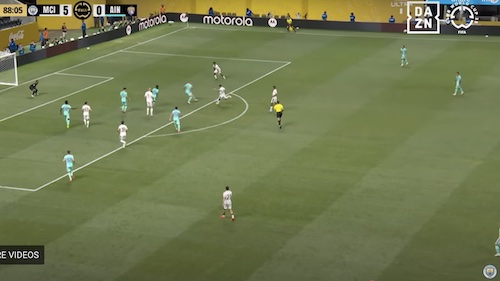|
By Tom Sheldrick As an England fan, this feeling is instantly recognisable. The morning after the night before. After another inept World Cup display by Fabio Capello’s side, we’re left needing to beat Slovenia to qualify from Group C. That looks an increasingly distant prospect. I shouldn’t be surprised. It happens every four years, we arrive on the global stage full of hope and expectation, with the world’s best-paid coach and a bunch of players on $150,000 a week, who have just been strutting their stuff in the latter stages of the Champions League. The World Cup begins, our boys discover they can’t pass the ball to one another, and we’re left with bruises such is the ferocity with which we come back down to earth. I can’t complain, because, walking around the streets of Bonn, Germany, this morning, being an Englishman somehow feels like a blessing. Last Sunday, after Germany battered Australia into submission in Durban, the brash tabloid paper Bild declared on its front page: "We’re going to blow you all away". Five days on, and the celebratory mood has long evaporated. It took just 60 first-half second for it all to change yesterday, in fact. German striker Miroslav Klose was given his second yellow for doing not-a-lot by the card-happy Spanish referee, and, before he’d had time to sit down in the dressing room, Serbia had gone and taken the lead. Young full-back Holger Badstuber was again exposed, Nikola Zigic – all 2.02 meters of him – won a header at the back post, and Milan Jovanovic lashed home. A man and a goal down, Germany were unable to get back into a game they had until then been, if not dominating, certainly growing into. It wasn’t the first time a World Cup game has turned on a red card in the opening week. Slovenia – Algeria looked like it was heading towards the 0-0 stalemate that a tepid contest deserved, before the North Africans’ sub Abdelkader Ghezzal got his second yellow for handball in the 72nd minute. Seven minutes later and Robert Koren had scored the goal which secured Slovenia’s first ever World Cup victory. Fast-forward to Thursday and Greece – Nigeria in Group B. The Super Eagles were in charge of the game, with an unimaginative Greece doing nothing to suggest they could come back from their 1-0 deficit. Then, Nigerian midfielder Sani Kaita and his Greek counterpart Vassilis Torosidis both thought they’d won a throw-in on the far touchline, Kaita tried to grab the ball off Torosidis, got a bit annoyed when he wouldn’t give it to him, so lashed out with his foot, and was rightly shown a red card. It was an example of the kind of unprofessionalism the World Cup looked to have left behind, and my feelings for the guilty Kaita – who was, like Tim Cahill at the weekend, left in tears by his dismissal – involve nothing but sympathy. "I made a mistake. That is all," he told reporters. "I am sorry for the whole of Nigeria." On the pitch, there was no room for sentiment, as Greece’s coach Otto Rehhagel swiftly acted to seize the initiative, bringing on a striker for a defender. The final, inevitable, twist came with Torosidis scoring Greece’s goal in the second half. Aside from the coincidentally poor refereeing performances in both games involving Germany, I have generally been massively impressed with the standard of officiating at the World Cup. The red cards that have been dished out have, aside from Klose and Cahill, been a result of naivety on the part of the guilty player. Lawrence talked about impact substitutes last week, but so far it has been the red cards that have been the game-changers. It’s simple maths really. 11 against 10, the 11 is normally going to win. (That’s what the band member was going on about in This Is Spinal Tap, when trying to explain why his amp had volume up to 11, when everyone else’s just went up to 10!) But it’s how quickly a switch flicks and the whole direction of the game changes that really gets me. Real die-hard cricket fans will tell you that this Twenty20 nonsense that’s got so popular is just a fad, it’s nothing on a good-old five day test match. Why? Five days chiefly filled with boredom, the outsider observer would note. But no, the reason they’re captivating is because, after balls and overs, sessions and days going in one direction, momentum can suddenly turn, with one key wicket, stunning catch or a bit of luck, even just a nice shot from the batsman. And all of a sudden it’s a whole different game. Back to the bigger round ball, and we saw the momentum of a game shift quite spectacularly at half-time yesterday, mainly thanks to a coach’s tactical bravery. US Bob Bradley made a double substitution at the break, with his team trailing 2-0 against Slovenia. Within three minutes the Americans were back in it, and one of the subs, Maurice Edu, deserved to have won it the match 3-2 in the last minutes. A game of two halves! Literary theory – and please forgive my rather basic grasp in this area – says that a piece of work is pigeon-holed in a category, or a genre, by ticking certain boxes. It happens all the time, pretty early on you know a film is a (naff) romantic comedy because it’s got a boy and a girl, normally awkward around each other, and one of their friends who is a bit of a laugh. You go through the film picking up on all the signs, and so you know pretty much how it’s going to end. We try the same thing in sport. This was going to be England’s year, we said before a World Cup ball was kicked. Germany was going to sweep everyone away, after one game of the seven it needs to win a World Cup. More reasonably, Nigeria were going to beat Greece until that red card, and Slovenia were going to beat the USA, it seemed at half-time. Then the USA roared back into the game, and when Edu’s shot found the net at the end, it was a great comeback to victory story. Then the referee – always one to tear up a script – ruled the goal out for some unknown infringement. That’s why we love sport. Although Americans may not be feeling quite as cheery about it this morning! If a well-organised, gutsy and perfectly able Ghana win against Australia later on today, the West Africans will be in control of a Group D that originally looked Germany’s to lose. If Australia, lacking its suspended best player Cahill, but with a little bit more street-wisdom than their opponents, can nick the three points then all four teams will be on three points, with one game to play. The one thing we’ve learnt, though, is not to count our chickens. And that’s why I’ll still be watching England on Wednesday. Just in case they surprise me. Tom Sheldrick is a freelance writer and can be reached at: tomsheldrick@hotmail.com |
Your Soccer Resource Center














